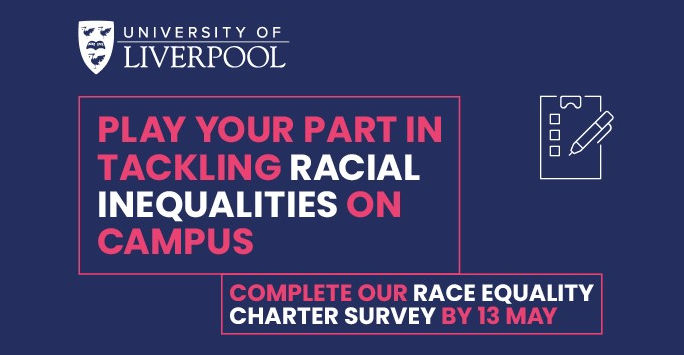
In February 2021, the University signed the Advance HE Race Equality Charter (REC) committing to eliminating racial disparities for staff and students at the University. Karishma Asher, Race Equality Officer, explains how the University is working towards achieving the goals set out in the REC, and how race and equality are closely aligned to our work on sustainability and the Sustainable Development Goals (SDGs).
Working towards a common goal
“The Race Equality Charter is a framework which helps universities be more inclusive by identifying where race inequalities are apparent within their institution. It then supports universities to self-reflect on the cultural barriers that affect minority ethnic staff and students, helping them assess why these inequalities exist, working with them to build concrete steps to implement the necessary changes,” explains Karishma.
Currently at the first stage of the REC process, the University is working to identify and analyse race inequalities at the institution and aims to deliver a report to Advance HE by Spring/Summer 2023. This report will include data and information on a wide range of areas, including the recruitment journey of staff and how students are taught and assessed at the University. “We will then build on our existing Action Plan to map out how we plan to tackle these issues,” adds Karishma.
Diversity and sustainability
The UN outlines how inequalities impact sustainability on a global level, saying ‘We cannot achieve sustainable development and make the planet better for all if people are excluded from the chance for a better life’. As such work on race equality at the University is closely linked to, and directly supports the institution’s Sustainability Strategy and commitment to meeting UN Sustainability Development Goals (SDGs).
SDG 10 ‘Reduced inequalities’, for example, is focused on reducing inequalities in income as well as those based on age, sex, disability, race, ethnicity, origin, religion or economic or other status within a country. “We hope to tackle these issues in multiple ways through identifying, targeting, and challenging racial inequalities at institutional and local levels. This spans individual behaviours through to cultures, processes, and policies,” explains Karishma.
Sustainability also links to race equality through SDG 3, ‘Good health and wellbeing’ and the University’s responsibility to create a safe environment for all staff and students as well as SDG 4 or delivering ‘Quality education’ to students. “This closely relates to our work on improving progression for ethnic minority researchers,” explains Karishma. “As an institution we are committed to evaluating and developing the support and resources available to enhance academic confidence, while facilitating racially inclusive teaching and learning.”
The REC Board is working closely with the Athena Swan Team on the Gender Equality Portfolio to meet the objectives of SDG 5 ‘Gender equality’. “Intersectionality is a key principle to the REC and ensuring that both work streams meet the needs of racially minoritised women, amongst other intersectional groups, is a high priority,” says Karishma.
“We hope that our work to improve these areas will encourage staff to stay at the University for longer, and create a more inclusive community. Similarly for students, this work will help to embed a good relationship between them and the city of Liverpool, creating a more diverse and culturally rich community,” she adds.
Putting plans into action
Reporting to the Equality, Diversity and Inclusion Committee, the Race Equality Steering Group - chaired by Professor Fiona Beveridge, Executive Pro Vice Chancellor for Humanities and Social Sciences - provides strategic oversight for the development, application and implementation of related Race Equality Charter activity.
“It’s important to keep in mind that we aren’t going to instantly fix race inequality, we need to be open and honest about where the inequalities are and then act strategically and sustainably in the way that we tackle them,” stresses Karishma. “Although we are only at the beginning of or REC journey, there are still plenty of things we can all do to promote race equality. It’s about approaching situations with a curiosity and readiness to learn, not being afraid to get things wrong, and not being afraid to act.”
Karishma adds: “It’s now time to be braver and bolder, we need to act together to implement these changes to provide a better future for those to come, while also remembering to celebrate ethnic diversity as much as we are trying to improve it.”
Find out more
To find out more about the Race Equality Charter, visit Advance HE’s website or read the Vice Chancellors interview on the University’s commitment to race equality.
Please also keep an eye out for how you can get involved with October’s Black History Month celebrations and February’s Race Equality Week.
